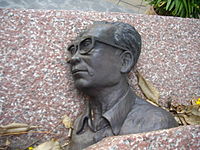About Puey Ungphakorn
- Puey Ungphakorn, MBE (Thai: ???? ??????????; RTGS: Puai Uengphakon; IPA:[puaj ??´?.p?a?.k?¯?n]; Chinese: ???; pinyin: Huáng Péiqian; 9 March 1916 – 28 July 1999), was a Thai economist who served as Governor of the Bank of Thailand and Rector of Thammasat University.
- He was the author of From Tomb to Womb: The Quality of Life of a South-East Asian, which to date remains one of the most influential writings about social security in Thailand. Born to a Thai Chinese family, Puey was a graduate of the first class of Thammasat University, teaching as a lecturer of French until winning a scholarship to study economics at the London School of Economics in 1938.
- His studies were interrupted by the Second World War, when he joined the Free Thai resistance movement opposed to the pro-Japanese military regime of Plaek Phibunsongkhram.
- He was captured as a prisoner of war in 1944 after parachuting into Chai Nat Province on a reconnaissance mission. Puey completed his studies after the war, receiving a doctorate in 1948.
- He joined the Ministry of Finance in 1949, serving in a progression of senior posts before becoming central bank governor in 1959.
- At 43, and serving for over 12 years, until 1971, Puey is to date both the youngest person appointed as, and the longest serving, Governor of the Bank of Thailand.
- As governor, he played a central role in shaping Thailand's economic development policies during the governments of Field Marshals Sarit Dhanarajata and Thanom Kittikachorn.
- He also was a proponent of financial co-operation in Southeast Asia, leading to the establishment of regional financial and institutions such as SEACAN.
- He was awarded the Magsaysay Award in the field of government service in 1965. An active academic, Puey was simultaneously Dean of the Faculty of Economics of Thammasat University from 1964 to 1972.
- In 1975 he was appointed Rector of Thammasat University, but resigned in protest following the massacre of student protesters on 6 October 1976.
- Tarred by nationalists as a leftist subversive, he was subsequently forced to flee the country for fear of his is safety, residing in the United Kingdom until his death in 1999.
Read more at Wikipedia
See Also
- Famous People's Birthdays on 09 March, Thailand
- Famous People's Birthdays in March, Thailand
- Famous economist's Birthdays on 09 March, Thailand
- Famous economist's Birthdays in March, Thailand
- Famous university teacher's Birthdays on 09 March, Thailand
- Famous university teacher's Birthdays in March, Thailand


 Date of Birth:
Date of Birth:  Place of Birth: Bangkok, Thailand
Place of Birth: Bangkok, Thailand